In This Episode << SLIDE LEFT TO SEE ADDITIONAL SEGMENTS
Fugitive Surrender
BOB ABERNETHY, anchor: Around the U.S., there are more than a million warrants out for the arrest of people who’ve been accused of an offense, often minor, but who have not paid their fines or shown up in court. We have a report today on a new program organized by the Justice Department to encourage offenders to turn themselves in. It works, and it’s done in churches, as Lucky Severson reports.
LUCKY SEVERSON: Nineteen-year-old Edacious and her cousin are on their way to church. She’s not here to worship; she’s here to surrender. There’s a warrant for her arrest on marijuana charges, and she has come to this church to turn herself in. Hundreds of others with outstanding warrants have also shown up.
UNIDENTIFIED MAN #1: Just to get this off my record, you know, to clear my conscience, for one thing.
SEVERSON: This is part of a two-year-old program coordinated by the Justice Department, called Fugitive Safe Surrender. It’s the brainchild of Pete Elliott, a member of the U.S. Marshals Service.
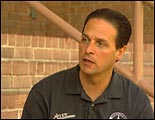 PETE ELLIOTT (U.S. Marshals Service): People have asked me why a church, and it’s simple. Churches give hope.
PETE ELLIOTT (U.S. Marshals Service): People have asked me why a church, and it’s simple. Churches give hope.
SEVERSON: A week earlier, Memphis religious leaders and law enforcement had announced at a well-publicized news conference that for four days fugitives, people wanted by the law for whatever reason, would be allowed to turn themselves in at a well-known church—this one in the African-American community. The church would be staffed with prosecutors, judges, and court personnel.
DAVID KUSTOFF (U.S. Attorney, speaking at news conference): And most importantly volunteers from New Salem Missionary Baptist Church to greet people and to welcome them as they come in, so that they can come in to an environment that is non-hostile.
DAVID JOLLEY (U.S. Marshal Service, speaking at news conference): This color flyer that you’ll see on this table up here is the flyer that the pastors have been taking back to their congregations. This is the flyer pastors take back to congregations, and their congregations have been handing out through the community.
MARK LUTTRELL (Sheriff, Shelby County, speaking at news conference): Many of these people will be able to clear up several warrants, which will make them law-abiding citizens and return them to the community in a productive way and will certainly assist us in law enforcement in clearing up this huge backlog.
SEVERSON: And what a backlog it was—37,000 outstanding warrants in Memphis alone.
The program got started in Cleveland two years ago. Memphis is now the sixth city to try it. In every case the program has exceeded expectations. Memphis is no exception.
Felony suspects who showed up were taken into custody, but most of those turning themselves in were wanted for minor offenses. A surprising number say that until now they felt they had no place to surrender. They’re afraid of the police and sheriffs’ departments. They’re afraid of going to jail. Many fugitives view the Memphis Justice Building itself as a place where people get lost and never found: the notorious 201 Poplar Street.
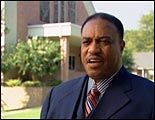 Pastor FRANK RAY (New Salem Missionary Baptist Church): 201 Poplar is a threat to most of them. And the reason is that you can go there, and what they did here in 30 minutes or an hour, two hours, it may take three days. That you can go there and surrender yourself—it may be three days before they’ll even hear your case, and you’re going to be stuck in prison for that many days, and some people have even gotten lost in the system.
Pastor FRANK RAY (New Salem Missionary Baptist Church): 201 Poplar is a threat to most of them. And the reason is that you can go there, and what they did here in 30 minutes or an hour, two hours, it may take three days. That you can go there and surrender yourself—it may be three days before they’ll even hear your case, and you’re going to be stuck in prison for that many days, and some people have even gotten lost in the system.
Mr. JOLLEY: I think every major city has this big, intimidating-looking downtown jail. We certainly have one here. And coming to church and taking care of this, as opposed to going down there, that’s a strong appeal to a lot of people.
UNIDENTIFIED WOMAN: I’m here to turn myself in on a warrant for driving on a suspended and a DUI charge which I got four years ago in Memphis.
SEVERSON: Why are you here?
UNIDENTIFIED MAN #2: Violation of probation.
SEVERSON: Lots of the fugitives are accompanied by family members. This man brought a member of the clergy.
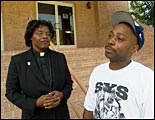 UNIDENTIFIED FEMALE MINISTER: I came here to support him, to let him know it’s okay to go ahead and turn it around and put this behind him. And you can stop looking over your shoulder.
UNIDENTIFIED FEMALE MINISTER: I came here to support him, to let him know it’s okay to go ahead and turn it around and put this behind him. And you can stop looking over your shoulder.
UNIDENTIFIED MAN #3: Man, I’ve had these warrants for probably five years, so it’s time. It’s hard. It’s hard to get a job. It’s hard to do anything.
SEVERSON: With the warrants?
UNIDENTIFIED MAN #3: Yeah, it’s rough. I mean, I really haven’t got anything to lose. I’ve got to start over. I need my life back.
SEVERSON: Jobs, food stamps, education—these things are out of reach for people with outstanding warrants. While they lineup to be processed, it’s red wristbands for fugitives, green ones for family members. The sheriff’s department doesn’t have the resources to round up the numbers of people who will turn themselves in over a four-day period. Here in Memphis, that was 1,500 people. First, their warrants are verified. They’re all fingerprinted and photographed. Then they wait for their turn in court.
Why was this church chosen? Because its pastor is respected in the community. Fugitives apparently trust the church more than they trust the police.
Pastor RAY: There’s been somewhat of a division between the justice system and the community, especially the religious community.
SEVERSON: Of the fugitives who have surrendered so far, 85 percent said they came in because it was a church.
(to fugitive): Does it feel better to you, coming here to a church?
UNIDENTIFIED MAN #3: Yeah, yeah.
SEVERSON: Rather than going to a big justice building?
UNIDENTIFIED MAN #3: Yeah, that makes a whole lot of difference.
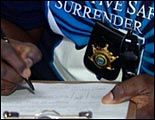 SEVERSON: Because it’s a church, does that make any difference? I mean, does it feel like it’s a little more welcoming?
SEVERSON: Because it’s a church, does that make any difference? I mean, does it feel like it’s a little more welcoming?
UNIDENTIFIED MAN #3: Well, that was my thought.
SEVERSON: Most cases are heard the same day, and the outcomes may be more lenient than they would be downtown.
MARY THORSBERG (Assistant District Attorney General): We try to fashion a settlement that will let these people get this over with today and go home with their cases disposed of.
Judge LOYCE LAMBERT RYAN (General Sessions Court, Division 15, Shelby County): Do you solemnly swear to tell the truth, the whole truth, and nothing but the truth?
SEVERSON: The courtroom itself is in a chapel adjacent to the main church. Those who surrender are moved through as quickly as possible.
Judge RYAN: You understand by pleading guilty you’re waiving your rights? You’re charged with violation of probation. I’m going to release you on your own recognizance. All right sir, I’ll accept your plea and sentence you on the offense of driving on suspended license: one day in jail; credit for one day, October 22, to pay your costs. If you do not appear on September 26 then another warrant will be issued for you again. Do you understand that?
SEVERSON: Although Memphis is only about 60 percent black, almost all those who turned themselves in were African American. One reason they are issued so many warrants, according to the judge, is economics.
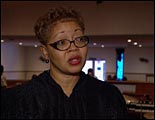 Judge RYAN: It becomes a revolving financial cycle—that if you don’t pay your reinstatement fee, you don’t pay your moving violations, it piles up. And so it’s a matter of finances. So it gets back down to core issues of poverty and income.
Judge RYAN: It becomes a revolving financial cycle—that if you don’t pay your reinstatement fee, you don’t pay your moving violations, it piles up. And so it’s a matter of finances. So it gets back down to core issues of poverty and income.
SEVERSON: Even though this is a church, some who showed up were afraid it might be a trap—a police sting operation.
Mr. ELLIOTT: We’ve done these things in the past. We’ve done them all over the country. I’ve been part of those, where we give out a free TV set to somebody, call them up; free Super Bowl tickets, free tickets for football, baseball game. Those things work. But it doesn’t build any trust between law enforcement and the community.
SEVERSON: Elliott’s idea for Fugitive Safe Surrender sprang from an incident in Cleveland when a police officer, a friend of his, was shot and killed making a routine traffic stop. The officer didn’t know the driver was wanted under a fugitive warrant.
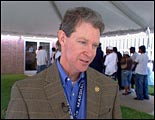 Mr. JOLLEY: There’s always the possibility of a violent confrontation, for whatever reason, even on the smallest warrants. It may be that the person just didn’t want to go to jail that day, or they had something in their possession they didn’t want the officer to find. You see all these car chases on TV—the helicopters flying overhead, guys running through stop signs and red lights, and they don’t know why, you know. Officer tried to pull him over, and he took off. They can’t figure out why.
Mr. JOLLEY: There’s always the possibility of a violent confrontation, for whatever reason, even on the smallest warrants. It may be that the person just didn’t want to go to jail that day, or they had something in their possession they didn’t want the officer to find. You see all these car chases on TV—the helicopters flying overhead, guys running through stop signs and red lights, and they don’t know why, you know. Officer tried to pull him over, and he took off. They can’t figure out why.
Mr. ELLIOTT: For every fugitive that peacefully and voluntarily surrenders, that’s one less dangerous confrontation our law enforcement officers have to have on the streets. I’ve been in law enforcement going on 25 years now. I feel the most comfort in my life when I’m at church. I feel the most peace when I’m at church. And I felt that individuals in the community that were wanted were basically no different than me.
SEVERSON: There was good news for the man who had brought a minister with him. Turns out there was no warrant for his arrest after all. But if this hadn’t been a church, he probably wouldn’t have shown up, wouldn’t have found out.
UNIDENTIFIED MAN #3: Well, by doing it at a church, man, you know, the church always has their arms open for you. It’s a safe spot.
SEVERSON: At least five other cities are hoping now to offer the surrender program. So your criminal justice system may soon be coming to a church near you.
For RELIGION & ETHICS NEWSWEEKLY, I’m Lucky Severson in Memphis.
ABERNETHY: The fugitive safe surrender idea is not free of controversy. A plan to introduce it in New Jersey was blocked because of concerns that it would cross the line between church and state.






